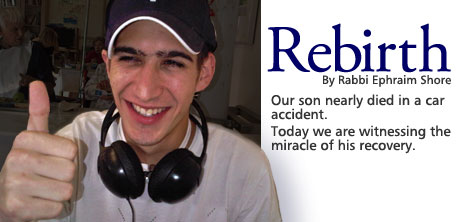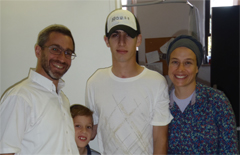 An Open Letter to University Presidents
An Open Letter to University Presidents


9 min read
Our son nearly died in a car accident. Today we are witnessing the miracle of his recovery.
Six weeks ago, our son, Yaakov, 21, was hit by a car while rollerblading in Jerusalem. After two emergency head surgeries, he lay unconscious in the ICU of Hadassah Hospital, growing thinner and paler, with tubes coming in and out of just about every part of his body, for two weeks.
We didn't know if he'd make it out of the hospital. The terror of those days was thick and black and forever. The unrelenting beeps of the countless machines attached to him were all we had to remind us of the passing hours and days as we sat by his side, praying, reading him Torah, holding his hands.
Would he have the same personality? Would he ever walk again? Life was one giant question mark. The doctors could not reassure us.
Finally, Yaakov's brain pressure went down to levels the doctors felt were safe to begin the process of allowing him to wake up. It took four days to slowly wean him off all the heavy drugs. With trepidation, we waited for him to hopefully awake. Would he recognize us? Would he know how to talk, or had the brain been damaged in that area, as the doctors feared? Would he remember anything of his past? Would he have the same personality? Would he ever again be able to walk, taste, read or do other basic things? Life was one giant question mark. The doctors could not reassure us.
All we could do was pray with all our hearts to the master of the universe: "Please bring us back our Yaakov!"
With the Shavuot holiday coming, some of Yaakov’s army buddies offered to stay with him those 24 hours so my wife and I could be at home with our other children – to gain some rest, some perspective, and to experience the full impact of the holiday.
When God revealed himself to the Jewish People on Mount Sinai and gave us the Torah 3,800 years ago, tradition tells us that all the sick people were healed: the lame walked, the blind could see. On each Shavuot, the anniversary of that event, the same power of healing returns.
 Yaakov with his parents and brother
Yaakov with his parents and brother
As the holiday finished, we received a call from Yaakov's army buddies who had sat at his side for 24 hours. "Come quick! He's awake! He recognizes us and he understands."
With tears in our eyes, we rushed to the hospital. On the surface, it looked like a repeat of that same awful route two weeks before, driving and crying to the hospital. But this was so different: our tears were primal expressions of relief, of joy and of thanks. When we stood at Yaakov's side and saw him smile at us, his eyes glassy but shining with recognition and life, we once again had trouble standing.
He couldn't talk, and he could hardly even open his eyes, but when my wife bent over to kiss him, he somehow found the strength to reach out his hand to caress her cheek to say, "I love you." It was heaven opening up. When his friend said goodbye, he slowly took his hand and drew it to his mouth to kiss it, and then he winked. With those small movements he was able to let us know that our Yaakov was back.
We have witnessed something few people have the opportunity to see: a miracle.
But actually, we've seen lots of miracles. Almost daily. Rabbi Dessler explains that the only real difference between a miracle and "nature" is its frequency. Is manna appearing with the dew each morning for 40 years in the desert any more miraculous than rotting seeds transforming into stalks of wheat or mango trees? But since we see it all the time, we lose touch with the marvel of it. The same goes with every aspect of our body's wondrous functions.
"Everything is a miracle!" sounds trite. But when you see creation appearing before your eyes, it is suddenly profound.
Now I know, "Everything is a miracle!" just sounds trite. But when you see creation appearing before your eyes, trite is not trite anymore. It is profound.
We have beheld what can only be described as a rebirth of a human being. At first he was an immobile blob of flesh. Then his eyes opened and he began to recognize things. Over the next days, he started to breathe by himself again, and slowly to move his hands, his legs. Later, our joy knew no end when he was able to sip a popsicle, and soon after, to drink by himself. It took a while, but soon he could even hold a water bottle himself!
A few days later, he painfully forced out his first words and our ecstasy was beyond expression. Then he began to eat solids, and to tell us what he needed. Like a baby's umbilical cord, they gradually removed him from the myriad pipes which had supported every aspect of his bodily functions.
Each morning upon waking, we say a beautiful prayer of thanks before we even climb out of bed: "I thank you, living God, for returning my soul into me in kindness…" Judaism describes sleep as "one-sixtieth of death." Our Yaakov was in a state that was more like 59 sixtieths of death, but God returned his soul. Almost every day we see more of him coming back home from somewhere far, far away.
Each day we fought the lurking, awesome fear of "What if this is as far as he's going to go? Maybe it will stop here!" We drew upon every drop of optimism and forced ourselves to be "convinced" that he was going to move further along. We found ourselves (and still do) torn between an immense sense of gratitude for how far he has come, and our uncompromising yearning for Yaakov to regain all his abilities, memories and self.
Positive thinking has a potent impact on the outcome of things. In fact, Judaism demands optimism. We have a loving God who has infinite power to help us. He's got a great track record: just as He's helped us in a million ways until now, we can surely count on Him to help us going forward. We should be shocked and amazed when things don't go the way we want them too. Shocked enough to ask what lesson he is trying to teach us in His love.
After one more week in the ICU, Yaakov was moved to the neurological ward of the hospital, and a few days later, still with his tracheotomy pipe sticking out of his throat, he was transferred to a rehab hospital.
As we were leaving, saying good bye to our new friends, the staff of the ICU, a social worker shared with us that everyone who leaves this place leaves with two very special gifts. First, they have a newfound perspective on what really counts in life. Petty problems are just that, petty problems. Secondly, a realistic appreciation of the incredible miracle that is life. Every one of the hundreds of things we do each day is simply amazing. When you see your child without that ability, and you imagine what life will be like for him without it (eating by himself, talking, going to the bathroom, reading, walking, holding, understanding, remembering things), you know how appreciative we all must be. "These gifts are for you, the family. Your son won't remember what he went through, but you will."
On one of those first days of reawakening, Yaakov was in tremendous bodily pain, shaking all over, suffering terrible headaches and enveloped in a huge fog. He got a glimpse in a mirror of his shaved head, huge scar, pale, thin face, and he began to cry. I hugged him hard and cried with him, but I told him, "Yaakov, you might be crying from pain, and I'm really sorry that I'm not more sympathetic. But I am crying tears of joy. I don't expect you to understand yet, but seeing you alive, feeling and aware, is so huge that all I can do is cry." He understood, and he was calmed.
We've encouraged people all over the world to work on these two important traits – not blaming and not complaining.
At first he didn't know his name or age, where he lives, or how many kids in our family. Today, Yaakov is out of most of his pain and he's communicating (in both Hebrew and English) beautifully. He still has a long way to go in a lot of areas, like a painful leg, broken jaw, more surgery, and holes in his memory, but we see more and more faculties returning almost daily.
He's returned to many of his wonderful traits, like not blaming and not complaining. Despite his present disabilities, he's almost always happy and he lights up when his next visitor shows up. Yesterday, we found more glass embedded in his arm, but he didn't complain or blame.
We've encouraged ourselves and people all over the world to work on these two important traits – not blaming and not complaining – and we've heard from hundreds of people about how they are working at it, just how difficult it is to change our negative habits, and the huge difference a little bit of awareness has made in their lives. (Click here to watch related video.)
One of my rabbis, a young father who was diagnosed with life-threatening cancer, was treated and then went into remission, shared with me something I've never forgotten. "If someone had offered me $10 million to go through this experience, I would never have taken it. But now that I've gone through it, if someone offered me $10 million to take it away from me, I would never give it up."
Now I understand what he meant. The agony, the deep, unimaginable fear and heartache of these last few weeks are something I would not wish on anyone. But the lessons my wife and many of our friends and family have learned from this are so precious; it's hard to imagine going back and living life without them. My appreciation for the beauty and the miracle of life, my understanding of the power of kindness, love and friendship; the life-altering impact of small (and large) caring gestures; the intimacy with God that comes with tears and heartfelt prayer; the strength and comfort of community; and for an earth-shattering lesson in unconditional love for a child, with no expectations or judgments.
For all of these treasures, and for Yaakov's return to us, I will be forever grateful.
Click here to read Ephraim's first article about his son.
Click here to watch "Where's the Salt!" A video on the Don't Blame, Don't Complain campaign.
